A good while back I received an e-mail from an unnamed reader asking about a really bizarre scene in a .hack game’s translation:
The .hack series of games, for the PS2, are pretty infamous for their shoddy localization work (for instance, the only Japanese city that got swapped with an American equivalent was Kujukuri to “Malibu”, creating a bunch of strange implications about a character living overseas). While replaying the games recently, I encountered Nuke Usagimaru’s completely incomprehensible introduction scene. The context of the scene is that he’s invited a bunch of random players to come see his comedy routine. When you get there, this happens:
I think he’s supposed to be telling bad jokes that are scaring off the audience, but the “jokes” are so bizarre that I wouldn’t even realize they were supposed to be jokes if I didn’t know in advance that he was a comedian. Did something get lost in translation here?
I’ve only played a bit into the first .hack game about 10 years ago, so I don’t remember much about it. I do recall it had a lot of material that needed localizing though, so I’m glad to finally take another look at it!
In this case, the above scene indeed feels strange, so I hunted down the same scene in the Japanese release. Let’s take a look at the three weird lines:
Joke #1
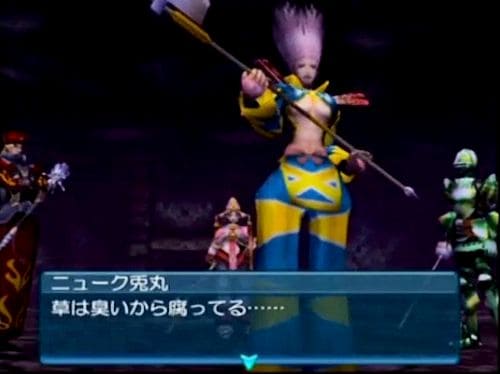 | 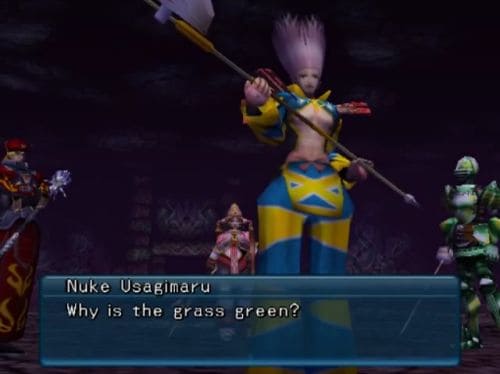 |
| .dot//Mutation (Japanese) | .dot//Mutation (English) |
| Japanese Text | Basic Translation | English Version |
| kusa wa kusai kara kusatteru…… | The grass is rotten because it stinks…… | Why is the grass green? |
For the first joke, even if you don’t know Japanese you can see some wordplay involved around “kusa”. The Japanese line is basically a lame pun about grass. The English line is… something else about grass. I wouldn’t even classify it as a joke. If anything, it feels almost like a philosophical question or one of those “sound of one hand clapping” things.
After this comedian says his line, some other characters leave because the joke is just so unbearable. It makes sense that a bad pun would be drive audience members away, but the strange localization choice for the English line makes their vanishing seem confusing.
Joke #2
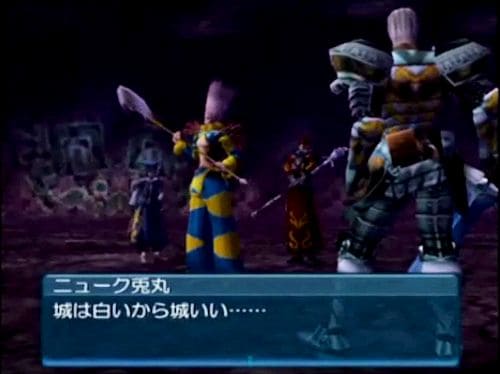 |  |
| .dot//Mutation (Japanese) | .dot//Mutation (English) |
| Japanese Text | Basic Translation | English Version |
| shiro wa shiroi kara shiro ii…… | The castle is a good castle because it’s white…… | Why is the sky blue? |
Again, it’s easy to see the wordplay in the Japanese line. It’s another bad pun on the word “shiro”, which can mean “castle” and “white”. In contrast, the English line still doesn’t seem like a joke at all. And, as before, more characters vanish after hearing this line. Their reaction is a logical response to the bad joke, but seems random and strange in response to the English question.
Joke #3
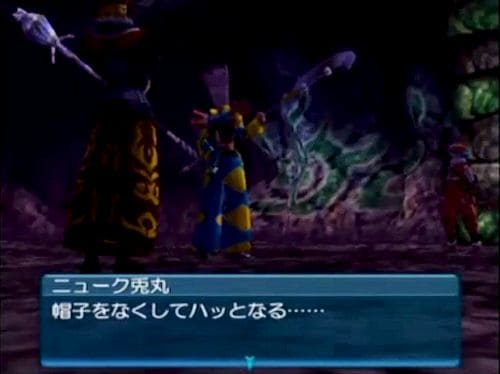 | 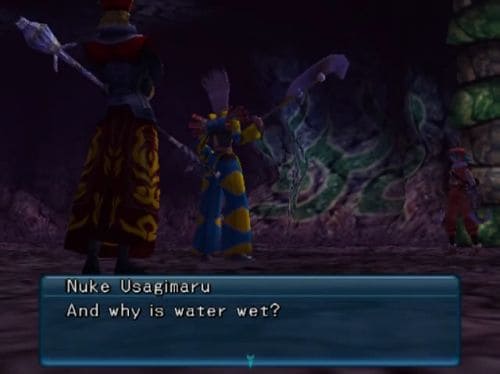 |
| .dot//Mutation (Japanese) | .dot//Mutation (English) |
| Japanese Text | Basic Translation | English Version |
| boushi o nakushite hatto naru…… | Losing a hat is startling…… | And why is water wet? |
In this final line, the pun isn’t as obvious if you don’t know Japanese, but “boushi” means “hat” or “cap”, and “hatto” can mean “hat” or “startling”. It’s another really dumb pun that causes more people to leave. The English line is just another random question to hear from a comedian.
Of course, it’s possible the localizers were trying to go for jokes so bad that they don’t even seem like jokes anymore. Or it’s possible that the localizers decided to go with philosophical questions that’ll blow your mind if you think too hard about them. But given the fact that he’s supposed to be making funny statements, both seem unlikely. Even more so considering the game’s general translation quality and voice direction. My personal opinion is that the localizers dropped the ball with this scene, which is demonstrated by players’ confusion.
Honestly, any dumb ol’ English puns would’ve fit the spirit and intent of the original scene perfectly. Some groan-worthy examples might be:
- The archaeologist’s career ended in ruins.
- Broken pencils are pointless.
- Glass windows are a real pane.
- I used to be a banker, but I lost interest.
All this said, it’s entirely possible that I’m missing something about this character’s background or other such information. If I’m overlooking something, let me know in the comments. And if you have any bad puns of your own that you’d like to share, post them in the comments too!


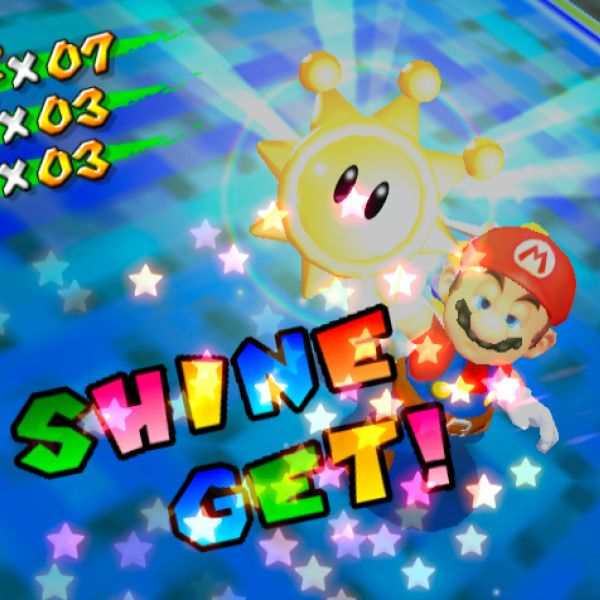


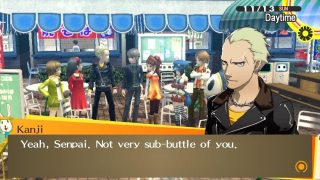
If the japanses version had ellipses. this is a stretch but what if the localizers meant to start it off like a joke but wernt sure how to end it but forgot to put in an ellipses to imply their was more?
like “Ok a cow and a pig walk into a bar….” or “knock knock?…” or something
Nope, those are full sentences, and Mato translated them clearly.
It doesn’t seem likely, because they’re already full sentences. These Japanese ellipses are meant for a comedic “pregnant pause” effect rather than a setup for something later.
I remember this scene back in the day and even as a dumb kid I knew something felt horribly off about the whole thing. .Hack holds a place in my memories, but not for any good reason.
A friend of me gave me all the PS2 games, so I started playing the first one. It felt like it was going to be a loooong commitment to get through everything, but looking back I kind of wish I had stuck with it so I could be more knowledgeable about it now. But now I have even less time to play them, heh.
I feel like maybe these lines consisted of two sentences in the translation, but half of it is never displayed. Maybe.
Ooh, that’s an interesting possibility too.
Why is the grass green? Because it lacks experience!
Why is the sky blue?
Because it’s sad!
Why is water wet?
Because if it was dry no one would drink it!
Thanks everyone I’ll be here all night!
I never played any of the .hack games, but i did watch the first anime series on Toonami back in high school and loved it. It was actually just rereleased earlier this year on DVD and i jumped at the chance to see it again. It is still just as amazing as when i first saw it so long ago.
What’s weird is they sort of half-translate the first one and then just modify that first thing instead of giving really stilted half-translations for all three.
Yeah, it seems like they wanted to keep with the grass topic in the first one. I’m thinking the translator wanted to put a different grass pun in there but couldn’t come up with one. Instead, the closest thing he/she could think of was “why is grass green?” and then followed that same concept for the other two questions, which were probably just as problematic. That’s just my translation spider sense talking though.
What kind of .hacks wrote this script? It’s not even funny!
(my line is genius, isn’t it? 😛 )
I wondered whether the first and third were trying to do something with GReen GRass and WeT WaTer, but the second doesn’t fit that ‘pattern’. Maybe it’s meant to rhyme sky with why…?
If that was the intent, it probably would’ve flown over every player’s head 🙁
(I tweeted at you but hey you have comments now!)
What if the ‘joke’ here is that he’s trying to tell a joke with a long setup and everyone gets fed up and leaves causing him to never actually finish the joke after the long setup. One of my favorite examples…
Do you know about the African chieftain?
You don’t!? OK well let me tell you…
There was an African chieftain who would receive a new throne every year for his birthday. When he would get a new one he would have the old one stored in his attic.
Year after year, throne after throne, the attic became filled with old furniture.
Then one day it collapsed on him, killing him.
The moral of this story is that those who live in grass houses shouldn’t stow thrones.
OR:
Once there were two Inuit fisherman Every day they would take their boat out in the cold lake and try to catch fish to eat and sell.
Well one particularly cold day one of them suggests that they build a fire in the boat. The other, of course protests saying that the wooden boat will catch fire if they do that!
Well, he doesn’t listen and starts a fire right there in the boat. And sure enough the boat catches fire and they both jump off into the freezing lake.
The moral of this story is that you can’t have your kayak and heat it too.
Sure, anything is possible, but it’s not obvious from the writing that that was the intent. If it were in a narrative then it would seem more possible, but as it is these three lines seem random and unconnected. The responses after each sentence would also still seem out of place, especially at first.
That’s true. Writer Damon is probably throwing them a bone Translator Damon wouldn’t.
I just realized “Green” is slang for rotten or moldy. Not that it explains anything else. There’s no great way to translate this, you’d just have to write new bad jokes. I feel like English has fewer words with double meanings in common use that would feel natural to actually say.
Maybe the translator didn’t get the wordplay or the English team was given a VERY raw translation to work from and they weren’t aware they were meant to be puns. Maybe the assumption was that they were just absurd statements with no meaning so they replaced with with absurd rhetorical questions?
The only thing that bugs me, though, is the “And” in the last one. Is that meant as a conjunction to link all the questions or is that being used loosely to mean “Finally”?
The world may never know.
Those are really good ones. Nice twist on the glass house and cake sayings.
Clearly the correct choice would have been “The archaeologist’s career ended in ruins. So ancient. Such ruin.”
The original Japanese jokes would be labeled oyaji gyagu – old man jokes, or dad jokes – in Japanese. They’re groan inducing puns because, as Clyde points out, you have similar sounding words put together to make sentences.
.hack is actually one of my favorite multimedia series. I played the living daylights out of the first game series, read the manga and light novels, and watched the anime. That said, I can tell you that you are not missing anything about his character. He’s really supposed a terrible comedian with a heart of gold. They mess up names and genders in the manga and light novels and terms are inconsistently translated between media, so a poor localization seems most likely.
The only one I could come up with was for joke number 2:
“A snowy day is all white with me.”
Oooh, that’s a good one! They should have used that.
Wow, I’d completely forgotten about this scene with Nuke (it’s been years since I played). It sucks the localizers couldn’t have come up with something that would fit for English speakers. Japanese people insert puns like crazy into their anime and games (Detective Conan people, it’s full of them) and it’s no different with the U.S. and Europe. We all have dorky pun jokes by the thousands and honestly anything could have worked as long as it was groan-inducing, so it begs the question as to why they dropped the ball here.
It was sent through Guerrilla mail, right? Sorry, I was embarrassed to put my name on it. Thanks for answering.
I oddly never had a problem with these lines. It’s just seems like one of those WTF is this guy talking about? Kind of type of things. Like “I thought these were supposed to be jokes!”
Surely a punny translation might have been better, but I think they must of had a reason for this. Perhaps they just couldn’t come up with puns that got the same point across.
I thought about something like ‘only good magicians could cast castles’ but I don’t know how good that one is.
I get the feeling,and im probably wrong, that the translator was going for bad observation jokes.
Something like “And what’s the deal with grass? Why is it green?”
“I used to be a banker, but I lost interest.” That one actually made me laugh. Should I be ashamed?
I’m reminded of Panon from the original NES release of Dragon Warrior 4. He’s repeatedly referred to as the world’s most awesomest comedian, and then you finally get him on stage, and are like, “those are supposed to be jokes?”
My favorite Japanese pun is always “There are two chickens in the yard.”
“So I slid over to White Castle the other day…”
“I lost my hat on the way here. It bowled me over!”
“Some jerk stole my hat. That should be a fedoral offense!”
Some ideas of puns I came up with:
“The grass soiled my honor.”
I actually liked MightyMatilda’s pun.
“Wizards can surprise us at the drop of a hat.”
The localizers could even keep the grass, sky and water theme if they injected some flavor into the question. “So, water is wet. What’s the deal with THAT?”. Still terrible, but at least identifiable as bad comedy.
… okay it really, really bugs me that besides the “green grass” line, the rest of the English ones have literally nothing to do with the Japanese lines. Like, if you’re going to throw out the original script, why replace it with that?